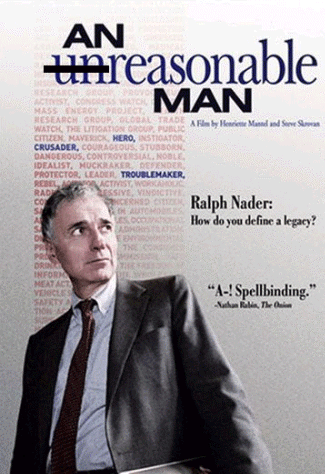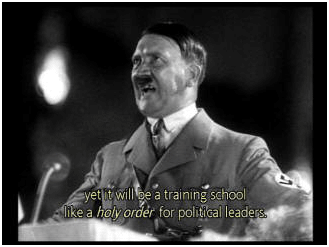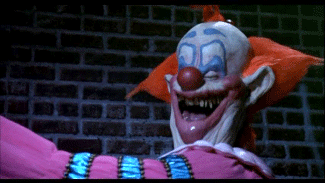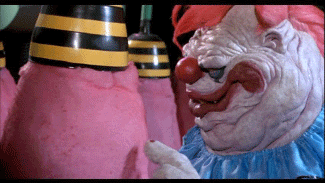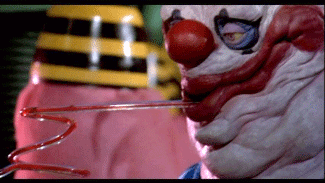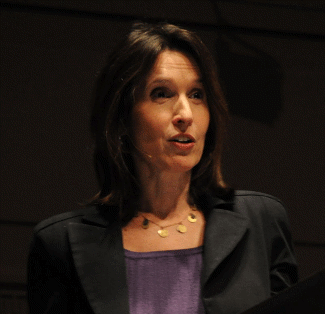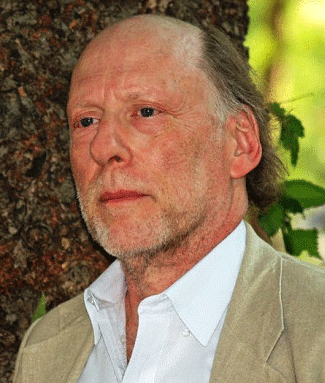PART 4 OF 7
[Pat Buchanan, "Reform Party" Candidate 2000] I came into the green room at CNN, and I walked in. There was the Democrats there, and there was Lanny Davis, and some other guys. "Hey, Pat, how are you? Good goin'? How's it goin' out there?" And then Ralph came in behind me, and he said, "Hey, Pat, how are you?"
I said, "Hi, Ralph." And this --
[Shudders]
Everybody backed away.
[Laughs]
And he said, "They're shunning me." And he was right. They wouldn't even talk to him. They wouldn't even talk to him. And it was remarkable. But they really saw him as a mortal threat.
[NADER'S RAIDERS FOR GORE: NADER, NUDGED, SAYS NO. A dozen old Nader's Raiders are urging Ralph Nader to reassess his presidential campaign, saying he could cost Vice President Al Gore the election. Mr. Nader's support is some 3 percent to 4 percent in most national polls, causing some Democrats to fear that he could win enough votes in some close states to push them into the Bush column. "It is now clear that you might well give the White House to Bush," the group wrote in an open letter to Mr. Nader yesterday. "As a result, you would set back significantly the social progress to which you have devoted your entire, astonishing career." The group, Nader's Raiders for Gore, accused him of reneging on a promise to campaign only in states where his candidacy would not hurt Mr. Gore's changes. His press secretary, Laura Jones, rejected the appeal. "There are always a few," she said, "who lose their zest and will to fight for progressive ideas and settle for moderate conservatives like Al Gore." (AP)][Joe Tom Easley, Former Nader's Raider] Nader's Raiders For Gore came about when Gary Sellers, ...
who was one of the first people who worked for Ralph full-time in the summer of '69, had an argument with Ralph ...
about the effect of Ralph's candidacy on a Democrat. Ralph pooh-poohed it all. What did he say?
"I wish I were as knowledgeable as to the future that you are," or something like that. It was a really condescending comment. Put him down. Gary came away from that really furious.
This book raises issues which may not be apparent from the table of contents.
It sketches some of the difficulties faced by our civilization—a civilization which might be perhaps described as aiming at humaneness and reasonableness, at equality and freedom; a civilization which is still in its infancy, as it were, and which continues to grow in spite of the fact that it has been so often betrayed by so many of the intellectual leaders of mankind. It attempts to show that this civilization has not yet fully recovered from the shock of its birth—the transition from the tribal or ‘closed society’, with its submission to magical forces, to the ‘open society’ which sets free the critical powers of man. It attempts to show that the shock of this transition is one of the factors that have made possible the rise of those reactionary movements which have tried, and still try, to overthrow civilization and to return to tribalism. And it suggests that what we call nowadays totalitarianism belongs to a tradition which is just as old or just as young as our civilization itself.
It tries thereby to contribute to our understanding of totalitarianism, and of the significance of the perennial fight against it.
It further tries to examine the application of the critical and rational methods of science to the problems of the open society. It analyses the principles of democratic social reconstruction, the principles of what I may term ‘piecemeal social engineering’ in opposition to ‘Utopian social engineering’ (as explained in Chapter 9).
And it tries to clear away some of the obstacles impeding a rational approach to the problems of social reconstruction. It does so by criticizing those social philosophies which are responsible for the widespread prejudice against the possibilities of democratic reform. The most powerful of these philosophies is one which I have called historicism. The story of the rise and influence of some important forms of historicism is one of the main topics of the book, which might even be described as a collection of marginal notes on the development of certain historicist philosophies. A few remarks on the origin of the book will indicate what is meant by historicism and how it is connected with the other issues mentioned.
Although I am mainly interested in the methods of physics (and consequently in certain technical problems which are far removed from those treated in this book), I have also been interested for many years in the problem of the somewhat unsatisfactory state of some of the social sciences and especially of social philosophy. This, of course, raises the problem of their methods. My interest in this problem was greatly stimulated by the rise of totalitarianism, and by the failure of the various social sciences and social philosophies to make sense of it.
In this connection, one point appeared to me particularly urgent.
One hears too often the suggestion that some form or other of totalitarianism is inevitable. Many who because of their intelligence and training should be held responsible for what they say, announce that there is no escape from it. They ask us whether we are really naive enough to believe that democracy can be permanent; whether we do not see that it is just one of the many forms of government that come and go in the course of history. They argue that democracy, in order to fight totalitarianism, is forced to copy its methods and thus to become totalitarian itself. Or they assert that our industrial system cannot continue to function without adopting the methods of collectivist planning, and they infer from the inevitability of a collectivist economic system that the adoption of totalitarian forms of social life is also inevitable.
Such arguments may sound plausible enough. But plausibility is not a reliable guide in such matters. In fact, one should not enter into a discussion of these specious arguments before having considered the following question of method: Is it within the power of any social science to make such sweeping historical prophecies? Can we expect to get more than the irresponsible reply of the soothsayer if we ask a man what the future has in store for mankind? This is a question of the method of the social sciences. It is clearly more fundamental than any criticism of any particular argument offered in support of any historical prophecy. A careful examination of this question has led me to the conviction that such sweeping historical prophecies are entirely beyond the scope of scientific method. The future depends on ourselves, and we do not depend on any historical necessity. There are, however, influential social philosophies which hold the opposite view. They claim that everybody tries to use his brains to predict impending events; that it is certainly legitimate for a strategist to try to foresee the outcome of a battle; and that the boundaries between such a prediction and more sweeping historical prophecies are fluid. They assert that it is the task of science in general to make predictions, or rather, to improve upon our everyday predictions, and to put them upon a more secure basis; and that it is, in particular, the task of the social sciences to furnish us with long-term historical prophecies. They also believe that they have discovered laws of history which enable them to prophesy the course of historical events. The various social philosophies which raise claims of this kind, I have grouped together under the name historicism. Elsewhere, in The Poverty of Historicism, I have tried to argue against these claims, and to show that in spite of their plausibility they are based on a gross misunderstanding of the method of science, and especially on the neglect of the distinction between scientific prediction and historical prophecy. While engaged in the systematic analysis and criticism of the claims of historicism, I also tried to collect some material to illustrate its development. The notes collected for that purpose became the basis of this book.
The systematic analysis of historicism aims at something like scientific status. This book does not. Many of the opinions expressed are personal. What it owes to scientific method is largely the awareness of its limitations: it does not offer proofs where nothing can be proved, nor does it pretend to be scientific where it cannot give more than a personal point of view. It does not try to replace the old systems of philosophy by a new system.
It does not try to add to all these volumes filled with wisdom, to the metaphysics of history and destiny, such as are fashionable nowadays. It rather tries to show that this prophetic wisdom is harmful, that the metaphysics of history impede the application of the piecemeal methods of science to the problems of social reform. And it further tries to show that we may become the makers of our fate when we have ceased to pose as its prophets. In tracing the development of historicism, I found that the dangerous habit of historical prophecy, so widespread among our intellectual leaders, has various functions. It is always flattering to belong to the inner circle of the initiated, and to possess the unusual power of predicting the course of history. Besides, there is a tradition that intellectual leaders are gifted with such powers, and not to possess them may lead to loss of caste. The danger, on the other hand, of their being unmasked as charlatans is very small, since they can always point out that it is certainly permissible to make less sweeping predictions; and the boundaries between these and augury are fluid.But there are sometimes further and perhaps deeper motives for holding historicist beliefs. The prophets who prophesy the coming of a millennium may give expression to a deep-seated feeling of dissatisfaction; and their dreams may indeed give hope and encouragement to some who can hardly do without them. But we must also realize that their influence is liable to prevent us from facing the daily tasks of social life. And those minor prophets who announce that certain events, such as a lapse into totalitarianism (or perhaps into ‘managerialism’), are bound to happen may, whether they like it or not, be instrumental in bringing these events about. Their story that democracy is not to last for ever is as true, and as little to the point, as the assertion that human reason is not to last for ever, since only democracy provides an institutional framework that permits reform without violence, and so the use of reason in political matters. But their story tends to discourage those who fight totalitarianism; its motive is to support the revolt against civilization.
A further motive, it seems, can be found if we consider that historicist metaphysics are apt to relieve men from the strain of their responsibilities. If you know that things are bound to happen whatever you do, then you may feel free to give up the fight against them. You may, more especially, give up the attempt to control those things which most people agree to be social evils, such as war; or, to mention a smaller but nevertheless important thing, the tyranny of the petty official. I do not wish to suggest that historicism must always have such effects. There are historicists—especially the Marxists—who do not wish to relieve men from the strain of their responsibilities. On the other hand, there are some social philosophies which may or may not be historicistic but which preach the impotence of reason in social life, and which, by this anti-rationalism, propagate the attitude: "either follow the Leader, the Great Statesman, or become a Leader yourself," an attitude which for most people must mean passive submission to the forces, personal or anonymous, that rule society.
Now it is interesting to see that some of those who denounce reason, and even blame it for the social evils of our time, do so on the one hand because they cannot conceive of a social science, or of reason in society, having another function but that of historical prophecy. In other words, they are disappointed historicists; they are men who, in spite of realizing the poverty of historicism, are unaware that they retain the fundamental historicistic prejudice—the doctrine that the social sciences, if they are to be of any use at all, must be prophetic. It is clear that this attitude must lead to a rejection of the applicability of science or of reason to the problems of social life—and ultimately, to a doctrine of power, of domination and submission. --
The Open Society and Its Enemies, by Karl R. Popper
[Gary Sellers, October, 2000] It's really sad. Ralph is a very sophisticated political thinker. A profound thinker. He knows what the consequences are.
[Joe Tom Easley, Former Nader's Raider] And so Gary called us and said, "Look, we oughta put together a letter to Ralph, ...
an open letter to Ralph. Set up this. Maybe we can help get Ralph out of the race."
[Gary Sellers, October, 2000] The consequences are really profound. Of course it'll lurch the Democratic Party a little bit to the left, ...
but it'll take 30 years to undo the harm that Ralph is going to do in the next 12 days.

[
Gary Sellers, October, 2000] It's really sad. Ralph is a very sophisticated political thinker. A profound thinker. He knows what the consequences are. The consequences are really profound. Of course it'll lurch the Democratic Party a little bit to the left, but it'll take 30 years to undo the harm that Ralph is going to do in the next 12 days.
[Joe Tom Easley, Former Nader's Raider] And out of it came a composite letter ...
that we presented to Ralph. And we opened up a Web site, and got in business as Nader's Raiders For Gore.
Naders Raider's For Gore
An Open Letter To Ralph Nader
November 7, 2000
Dear Ralph:
For 35 years, you have stood for the principle that only informed and active citizens can ensure the strength and integrity of our democracy. The hundreds of idealistic young people you brought to Washington-whom the press dubbed "Nader's Raiders"-became the vanguard of these "public citizens." Using skills from law, medicine, economics, and other professions, our mission was to dig hard for facts and speak truth to power. You uniquely personified the idealism and integrity of this effort and are the public trustee of our ongoing legacy.
In this context, we ask you to review the facts and premise of your campaign for the Presidency. To ask voters to support your candidacy on the basis that there are no major differences between the Republican and Democratic Parties is a serious misstatement of fact. No Nader Report would support that assertion. There are major differences between the parties on the environment, social security policy, health care reform, tax policy, and reproductive rights, to name just a few.
The next President will make over 5000 Executive Branch political appointments. Mr. Bush's appointees, unlike Mr. Gore's, will much more likely oppose the full, active enforcement of environmental, consumer protection, and occupational health and safety laws which Nader's Raiders worked so hard to enact. Mr. Gore has a long and distinguished record of commitment to these goals. George W. Bush does not. We are especially concerned about Bush's appointments to the Federal judiciary where so many of the battles over enforcement of these laws are decided. Please remember that President Nixon appointed Mr. Rehnquist to the Supreme Court 30 years ago and his conservative hand still grips American jurisprudence. Please consider that 48% of President Reagan's 379 federal judgeship appointees are still serving today and that George W. Bush, if elected, will have an immediate 64 vacancies to fill as early as January 21, 2001. Bush judicial appointments likely to serve as long as 30 years will be far more likely to deny standing to consumer complaints, to deny or limit discovery, and to limit remedies to expose or rectify corporate errors and abuses. In addition to its influence in the Federal judiciary, the Republican Party currently controls both the House and the Senate. If the White House also reverts to Republican control, the checks and balances against partisan extremism on environmental and consumer issues will be the weakest in 20 years. Executive branch enforcement of environmental and consumer laws and regulations may be passive.
With full respect for you and profound concern over these looming threats to the Nader legacy, we ask you to reassess your candidacy. The attached opinion polls now show that you are drawing between 3 and 8% of the total vote in each of nine states · Florida, Michigan, Missouri, New Mexico, Nevada, Ohio, Oregon, Washington and Wisconsin, a level of support which is equal to or more than the present differences in support for Al Gore and George Bush. More importantly your candidacy has reduced Al Gore's support to between 42 to 45% since most of your likely voters would be in the Gore camp if you were not on the ballot. In an early August fundraiser, in response to a direct request that you withdraw in light of the likely election train wreck you would cause, you declined for three reasons. First, you predicted that Pat Buchanan would reduce the Bush vote by a comparable number. You were wrong. Second, you said you would campaign only where your candidacy would not hurt Gore's ability to carry the state. You now have broken that pledge to us as you have campaigned in Florida and Michigan among other states. Third, you suggested that only "clairvoyance" could predict your impact on the race. It no longer takes clairvoyance. It is now clear that you might well give the White House to Bush. As a result, you would set back significantly the social progress to which you have devoted your entire, astonishing career. You have sacrificed for the benefit of the common good your entire adult life, as we, you friends and colleagues, know well. There have been countless occasions where you stayed in the background when that helped achieve the maximum benefit for others. It is time for you once again to step aside in the best interests of our nation. It would be a cruel irony indeed if your major legacy were to erase the victory from the candidate who most embodies your philosophy, Al Gore, and to give the Executive Branch to the party which has consistently resisted your progressive ideals.
We urge you to ask your supporters, as we do now, to honor your ideas and to vote for the man who is most likely to put them into action - Al Gore.
Sincerely,

Former Nader Raiders, Colleagues:
Gary Sellers, Nader's Raider 1969-73
Michael L. Charney, MD, Nader's Raider 1969
Beverly Moore, Nader's Raider 1969-73
James S. Turner, Nader's Raider 1969-72
Peter Petkas, Nader's Raider 1970-74
Harrison Wellford, Nader's Raider 1969-72
Neil G. McBride, Nader's Raider 1972-73
Joe Tom Easley, Nader's Raider 1969-72
Anita Johnson, Nader's Raider 1979-84
Miles Rappaport, Nader's Raider 1979-84
James Dickson, Nader's Raider 1976-78
Ron Plesser - Nader's Raider 1972-74
[Joe Tom Easley, Former Nader's Raider] Imagine, his own former associates have turned against him.
[Ralph Nader] You know, that always makes for newspaper copy.
[Joe Tom Easley, Former Nader's Raider] Ralph's response to this bothered me a good deal. "Oh, these are just some people who worked for me a very long time ago, and they've gone on to their other activities." The implication being that whatever public interest we had years ago was long gone, and now we were out there ...
working for Phillip Morris, or something like that.
[James Musselman, Former Nader's Raider] I was approached by them, and I asked everybody who approached me simple questions. I said, "How do you feel about universal health care? How do you feel about the death penalty? How do you feel about NAFTA?" And then they would agree with me on all the issues, and I would say, ...
"So why are you supporting Gore?"
[Joe Tom Easley, Former Nader's Raider] I don't think there was anything that Ralph Nader stood for in his campaign that I didn't believe in. There wasn't anything that he said that I didn't think was right, or wouldn't make this a better country if those policies were enacted.
But it was very clear that Ralph Nader was not going to be elected president.
[Robert Fellmeth, Former Nader's Raider] My feeling was, "Listen, I'm on the outside. I'm firing at Republicans. I'm firing at Democrats. I want to be free to do that. I'm not gonna support anybody. I'm not gonna run your campaign, Ralph.
I'm not going to sign a letter opposing you. I'm completely out of it." I think a lot of Nader's Raiders took that position because, as he taught us, we hit whoever gets elected.
We want to be in a position to do that.
[Nader at the Coliseum][Gregory Kafoury, Nader Campaign Organizer] In late June of 2000, Ralph called me and said, ...
"Greg, I want you to do an exquisite event for me when I'm in Portland on August 25."
[Theresa Amato, Nader Campaign Manager] The Kafoury and McDougal team in Oregon said, ...
"Well, why don't we rent the Coliseum in Oregon, which seats something like 9,000, 10,000 people?"
We had to divert all the financial resources to be able to do that. And then, because all of our financial resources were tied into doing that, we had to make sure they worked.
[Ralph Nader in Portland! One night only! In Person at Memorial Coliseum, Friday, August 25, 7:00 p.m. Hear the man Bush and Gore are afraid to debate! "The difference between Bush and Gore is the velocity with which their knees hit the floor when corporations knock on their door." -- Presidential Candidate, Ralph Nader. Tickets still available, call 223-1399.] [Jason Kafoury, Nader Campaign Organizer] An hour into the show it had completely sold out. They were turning people away. Ten thousand people paid seven bucks a head just for Ralph. No entertainment. No music. Just Ralph's political message.
And the super rallies were born.
[Ralph Nader] Thank you. Thank you very much.
[Gregory Kafoury, Nader Campaign Organizer] We did Seattle. We did Minneapolis.
We did Boston. Had a great event in Boston.
[Ralph Nader] It was one rally at a time. And every rally had a tiny surplus, and gave us an opportunity to go to the next city.
[James Musselman, Nader Campaign Organizer] I remember he called me up and said, ...
"We're gonna do New York City. Madison Square Garden." I said, "Okay, next month?" He goes, "No, in 10 days." I said, "Are you crazy? Ten days? New York City? Madison Square Garden?"
He goes, "No. You can do it."
[Gregory Kafoury, Nader Campaign Organizer] Three hundred thousand bucks to do Madison Square Garden.
[James Musselman, Nader Campaign Organizer] It was 10 days of no sleep, and it was quintessential Ralph. It was like, "We're doing this, and don't ask any questions. Just do it. It can be done.
"I have faith in the people who are behind this, so let's do it."
[NADER ROCKS Madison Square Garden, Friday, October 13 at 8 pm]
[Folk] [Gregory Kafoury, Nader Campaign Organizer] We had Eddie Vedder, Ani DiFranco, Bill Murray, ...
Tim Robbins, Susan Sarandon, Ben Harper, ...
Patti Smith, Phil Donahue, and Michael Moore.
[Jason Kafoury, Nader Campaign Organizer] It was an unbelievable lineup.
[Bill Murray] Someone said to me, "Who are you gonna vote for?"
I said, "I'm gonna vote for Ralph Nader." Who are you gonna vote for?
[Audience Applauding, Cheering] [Susan Sarandon] You understand that it is more than a win-or-lose situation. It's the bigger picture, and this is where that bigger picture begins.
[Michael Moore] We're at the place we're at because we have settled for so less for so long. If we keep settling, it's only gonna get worse.
The lesser of two evils: you still end up with evil. You still end up with evil.
The lesser-evil strategy of Anybody But Bush rendered progressive movements demoralized after the election. Not only did they fail to beat Bush, but the self-censorship involved in supporting the pro-war corporate Kerry campaign silenced the voice of the peace and other progressive movements. The professional liberals are blaming the supposedly conservative values of Americans, the tactical mistakes of the Kerry campaign, the sycophancy of the corporate media, everything but their own surrender to the politics of the lesser evil. The more upbeat post-election assessments try to highlight a new progressive institutional infrastructure to support the Democrats, including America Votes, Progressive Majority, Camp Wellstone, Democracy for America, Center for American Progress, Air America Radio, Media Matters, MoveOn.org, and Progressive Democrats of America, groups that are bankrolled in large part by liberal capitalists like currency speculator George Soros, insurance magnate Peter Lewis, and bankers Herb and Marian Sandler, who collectively have pledged to put $100 million into this infrastructure over the next 15 years. [60] But these assessments probably say more about career opportunities for professional liberals than the real prospects for any antiwar, anti-corporate insurgency inside the Democratic Party.
In their rank-and-file majority, Democratic voters were against the war in Iraq and for domestic policies that would benefit working people. But in a case of lesser evilism run amok, Democratic progressives defeated themselves by voting for pro-war corporate Kerry as the "electable" candidate in the primaries, leaving the antiwar candidacies of Dennis Kucinich and Al Sharpton with a combined total of barely 1 percent of the Democratic National Convention's delegates. Kucinich kept his campaign going up until the convention on the promise that he would fight there for antiwar and other progressive platform planks. But then, finding that he could not even muster the 20 percent support required for a platform committee minority report to force a vote of the whole convention on his alternative planks, Kucinich withdrew those proposals at the Democratic Platform Committee meeting. He could have at least made the committee members go on record as to where they stood on his progressive planks by calling for a vote on his proposals. But he instructed his people on the committee to drop his platform amendments without calling for a vote. That was how the progressive remnant of the Democratic Party went down to a crushing defeat and gave up without a fight in 2004. [61]
Not only were the movements dispirited, they were also confused by the defensive campaign around Kerry as the lesser evil. They were unable to recognize serious harms when advanced by the "lesser evil" and consequently they were inert as the congressional Democrats' pushed through the Intelligence Reform and Terrorism Prevention Act of 2004 in December. Seeking to bolster their credentials as "National Security Democrats" and one-up the Republicans' anti-terrorism warriors, the Democrats goaded a bloc of reluctant moderate Republicans into passing the bill despite their concerns about its further erosion of civil liberties and its concentration of the intelligence apparatus in the hands of the Pentagon. While the creation of the intelligence czar captured the headlines, the small print in the bill enacted key elements of Bush's proposed Patriot Act II, including steps toward a national ID card with federal standardization of state drivers' licenses and ID cards, expanded FBI powers to conduct secret searches and surveillance, detention without bail for accused terrorists indicted by grand juries, and sharing secret grand-jury information with foreign and domestic law enforcement agencies.
When the new session of Congress convened in 2005, Democrats provided comfortable margins of victory for a string of Republican initiatives: a bankruptcy bill that virtually restores debt peonage; a tort reform bill that closes the state courts to many class-action suits against corporate crimes; and an anti-conservation, pronuclear energy bill. When Bush asked in March for authorization to spend $82 billion more for the wars in Iraq and Afghanistan, the Senate approved it 99-0, and only thirty-four Democrats in the House, less than 20 percent of the Democratic caucus, voted against further funding of the occupations.
--
Independent Politics: The Green Party Strategy Debate, edited by Howie Hawkins
[James Musselman, Nader Campaign Organizer] It really gave me a lot of hope for our society, because there were issues being talked about that night ...
which had not been talked about in 20, 30 years in American politics.
[Ralph Nader] The students are not learning. They're not learning citizen skills. They're not learning how to practice democracy.
They're not learning the creative force of their personality, and idealism and imagination.
Maybe if we started talking about citizen globalization, civic globalization, instead of corporate globalization, the world will move forward! Let not future generations look back on us ...
and say that this was the last generation ...
that refused to give up so little in order to achieve so much.
[Bill Murray] He fights almost impossible battles, and he's won a number of them. He's not afraid.
I think he's the best American I know.
[Man Singing Folk]
[Audience Applauding] [Jason Kafoury, Nader Campaign Organizer] I expected us to be on the front page of the New York Times. And we had a story, but it was buried, you know, 20 pages in. No other political person -- Bush or Gore -- had gotten 20,000 people to pay money to hear them speak. Ralph was the only guy doing it. And yet the establishment media froze us out.
[THE GREEN PARTY, Nader Supporters Fill Madison Square Garden][Theresa Amato, Nader Campaign Manager] And the kind of coverage that we did get was all about the horse race.
"How are you gonna affect Al Gore?"
[Crowd Chanting] [Let Ralph debate! Let Ralph debate!] From the very beginning months of the campaign, we knew in 2000 and in 2004, we would have to try to get into the presidential debates.
[Phil Donahue, Nader 2000 Co-Chair] Ralph Nader could visit every city and town in this nation personally, and not reach 10% of the people who watch the debates.
[Theresa Amato, Nader Campaign Manager] Now most people don't understand how the presidential debates are run. They have memories of the League of Women Voters hosting it, or they think journalists host it.
But it's really a private corporation that sits a few blocks away from here on New Hampshire Avenue in Washington, D.C., that is run by the former chair of the Democratic National Committee, ...
and the former chair of the Republican National Committee.
[1200 NEW HAMPSHIRE AVENUE]
[COMMISSION ON PRESIDENTIAL DEBATES][Phil Donahue] One is the biggest lobbyist for the gaming industry. The other is a lobbyist as well. Frank Fahrenkopf and Kirk produce --
they were producers -- they decided which candidates the voters could see. And their sponsors were Anheuser-Busch, and US Airways. Corporations.
Can you imagine how much an American corporation would want Ralph Nader on that stage?
[Theresa Amato, Nader Campaign Manager] They set criteria that says you have to have 15% ...
of the measure of support, measured by the average of five different national polls.
[Lawrence O'Donnell, Political Analyst] But if what we're picking is a poll number, then what we're picking, what we're in effect saying is, "We'll allow you in the debates if we think you're a factor in the election." And so in an election in which now the Gore world wants to say, "Ralph Nader lost the election for us" --
I guess he must've been a factor in the election. But you said he couldn't be in the debates, because he wasn't a factor in the election.
[Man] Polls showed two-thirds of the American people wanted him in the debates.
[Woman] Because Ralph Nader speaks to issues that the other two candidates are ignoring. Both candidates are pro-death penalty, for instance.
[Man] Look at which issues concern the American public. A fairly broad slab of them are not being covered in the debates as far as we can tell.
[Jason Kafoury, Campaign Organizer] But they froze Ralph out of the debates. The first debate between Gore and Bush was Tuesday, the third of October, in Boston.
[Theresa Amato, Nader Campaign Manager] The campaign had decided that if we weren't going to be able to be in the actual debate on the stage, that we were going to try to be in the debate hall. Thirty seconds.
[Jason Kafoury, Nader Campaign Organizer] I got a phone call from Ralph's entourage ...
that was touring with him, at about 8:00 or 9:00 at night, and they said, "Jason, what we really want for tomorrow is a ticket to the debate." We got this kid at the University of Massachusetts, where the debate was gonna be held, and his dad had gotten him a ticket.
I called this kid, and I said, "How would you, in the name of democracy, like to have a press conference tomorrow at Harvard where you hand over your ticket to Ralph Nader and say ...
[Welcome to UMass Boston, Host site of the U.S. Presidential Debate 2000] 'I think you should be there at this debate?'" And the kid loved it.
[Theresa Amato, Nader Campaign Manager] There were lots of people protesting the exclusion of third parties including, I should mention, not just the Greens. The Libertarians are upset.
Other third parties would like to have a chance to talk to the American people.
[LET RALPH DEBATE / WE WANT DEMOCRACY]
[Man Singing Folk] [Tarek Milleron, Nephew] We hopped on the "T," and we rode to this staging area for the debates..
Because there was huge security around the debates. Three perimeters, and all the Secret Service, and hundreds of cops and so forth.
And there were also well over 5,000 people there protesting to let my uncle in the debates.
[People chanting] Let Ralph debate! Let Ralph debate!
[Ralph Nader] It was an unbelievable scene. It was like out of some, you know, gigantic painting of a semi-revolutionary journey.
[Tarek Milleron, Nephew] As we started passing these barricades, and these thousands of people recognized my uncle inside the bus, they just went crazy.
[Let Ralph debate! Let Ralph debate!] Our ticket was for a, you know, video of the debate, ...
where we'd watch it from a remote location.
[Ralph Nader] I was confronted by someone who said he was in charge of security for the Debate Commission. A private security firm.
[Tarek Milleron, Nephew] And they said, "You, Mr. Nader, are not welcome." The man who came out had a Greek last name -- it was Vasaris. And my uncle greeted him in Greek. And so it sort of threw him off a little bit. It was pretty comical. But he immediately reverted to, "Mr. Nader, you're not welcome here."
[To Ralph] Okay, here's the situation.
[Ralph Nader] Yeah.
[Tarek Milleron, Nephew] We have an arrangement to do a show with Fox. Their truck is inside. We could walk through with our ticket, sit in the truck, watch the debates, and do the show.
[Man Speaking] "Yeah, but that's not an option sir."
[Tarek Milleron, Nephew] Right now the Commission is saying they will not let us through the gate to sit in the Fox truck to watch the show, the debate, and then proceed with the interview. So the officers are telling us once again that the Commission's decision is to have us leave the premises.
[Ralph Nader] I kept saying to myself, "I can't believe I'm in America. I can't believe this is going on."
[To Police] Gentlemen, I think you're being subjected to an unlawful order, and you really ought to go to your superiors, ...
because a private party cannot misuse ...
the status of the state police. You're the state police?
[Policeman] Correct, we are.
[Ralph Nader] They cannot do that.
[John Vezeris] Okay, what's gonna happen -- we have two options.
[Ralph Nader] Yeah, yeah.
[John Vezeris] You were warned once before that if you returned, you were gonna be placed under arrest for trespassing.
Is it your intent to be arrested?
[Ralph Nader] Of course not. I have never been arrested, and I will not be arrested.
[John Vezeris] We're still gonna give you the option, Mr. Nader.
[Ralph Nader] I don't understand --
[John Vezeris] Please leave the scene, or you're gonna be placed under arrest for trespassing.
I really don't want to get in a debate with you. We'll give you a police escort off the grounds, or we'll give you a ride off the grounds, or you can be placed under arrest for trespassing and taken off the grounds.
[Ralph Nader] Let me please --
[John Vezeris] What would you like to do right now, please?
[Ralph Nader] Let me please just reply to you. I have no understanding of why you are being instructed to do this. We have an official invitation from one of the major television networks.
[John Vezeris] Well, they're not allowing you access to the grounds.
[Ralph Nader] Who's not allowing me? The Debate Commission?
[John Vezeris] The Debate Committee. Correct, sir.
[Ralph Nader] They have to --
[John Vezeris] I really do not want to get into an argument with you. You seem like too nice of a man to argue.
[Ralph Nader] I don't want to argue. All I want to ask you is, this is a political exclusion. I'm not a security risk. I'm not being disruptive. This is a political exclusion. You should not be misused. The authority of the State of Massachusetts should not be misused for a political exclusion of a presidential candidate who has a ticket to be in Kripke Auditorium to watch the debate on remote television, and who has an official invitation from Fox News. So --
[John Vezeris] Okay, sir.
[Ralph Nader] I make my point?
[John Vezeris] Very good.
[Ralph Nader] This is the strangest situation I've ever seen.
[John Vezeris] How are we gonna get you off the property, Mr. Nader? We have to get a bus or whatever.
[Al Hunt, CNN] The Presidential Debate Commission ...
excluded Ralph Nader and Pat Buchanan from the presidential debates. They also wouldn't even let Mr. Nader into the hall. The independent presidential candidate was given a legitimate ticket by a student supporter for a remote area in the auditorium. But acting like thugs, officials threatened to have him arrested if he didn't leave the premises. Presumably, Mr. Nader's presence might have offended some of the Commission's fat cat contributors in their prominent seats.
[Pat Buchanan] I give him credit. He went down there. I told 'em. I went to parochial school, and if I'm told you don't go somewhere, you don't go somewhere.
[Gene Stilp, Former Nader's Raider] He should not have left. He could have made his point that way, by being escorted out manually by the police, and he could've had a bigger impact in 2000.
[Ralph Nader] Perhaps, but it would've been a very short time, and the complications of being a defendant would've been longer term. And it would've been a defensive situation on my part, not an offensive situation, which is what I turned it into when I sued the Commission on Presidential Debates.
[To audience] They threw out the wrong guy this time.
[Audience Cheering] [Theresa Amato, Nader Campaign Manager] It turns out we found in a subsequent lawsuit that their counsel had passed around a face book.
[Pat Buchanan] [Laughs] They had Ralph's picture they gave all the cops.
[Theresa Amato, Nader Campaign Manager] Sheets of paper with the pictures of all the third-party candidates, and their vice presidential candidates, and basically said, "If any of these people show up on the premises, don't let them in."
[Pat Buchanan] They had a picture of me, like I was gonna break in? Okay, this is the face book. Gotta look out for these guys. Ralph was the number one guy they were looking for.
[Laughs] He's on the top of the list.
[ATTACHMENT TO NADER/CPD SETTLEMENT AGREEMENT / Dear Mr. Nader: In October 2000, you filed a lawsuit against the Commission on Presidential Debates and its co-chairs, Paul Kirk and Frank Fahrenkopf, in which you asserted claims concerning your ticketed right to enter an auxiliary viewing auditorium in the UMass campus on October 3, 2000, the night of the presidential debate. The Commission and its co-chairs did not know about your interest in attending the auxiliary viewing auditorium. If we had had a clear understanding of your intentions, every effort would have been made to protect your right to attend that event. We apologize for the misunderstanding of John Vezeris, the security consultant for the Commission, on the night of October 3 that resulted in your being required to leave the campus so that you could not attend the auxiliary viewing event and for any inconvenience to you. For the Commission and its co-chairs, Paul Kirk and Frank Fahrenkopf, Sincerely, Janet Brown, Executive Director][Theresa Amato, Nader Campaign Manager] The Commission did write a written apology, and they ended up giving $50,000 ...
to the Electoral Reform Project at Harvard Law School.
[Phil Donahue] It all backs up to the guys outside the Capitol ...
with the briefcases, ...
funding the people who make a vote and can make or break billions and billions of dollars' worth of business.
Their life is the price of their stock, and Ralph Nader threatens that. And we cannot overstate the power that they bring to stop him from doing that, including the power to decide ...
that he is not gonna get on this stage.
[Woman Newscaster] And Nader is showing no signs of backing off.
[THE NADER FACTOR, 36 ELECTORAL VOTES][Ralph Nader] Gore is gonna have to understand he's gonna have to earn his votes.
Bush has to earn his votes. I have to earn my votes. No one's entitled to any votes.
Katie Couric] The bottom line remains. It's not over until the votes are counted. And I mean really counted one by one.
Twice we've taken back so-called "final" results in Florida.
[Tom Brokaw] My guess is that in a lot of the Nader instances, ...
that he got new voters to the polls as much as Jesse Ventura did when he ran in the State of Minnesota. People who were turned off by the political system altogether decided that they would turn out and vote for Ralph Nader.
They would not have voted for either Al Gore or for George Bush.
[Katie Couric] In fact, many people say they would have stayed home ...
if those two names alone had been on the ballot, and just sat on their hands and not voted for either candidate.
[Tim Russert] But you know what Democrats are gonna say. If their candidate loses by one percent, and Ralph Nader got two, they're not gonna look at the exit polls, Katie.
They're gonna point their finger and say, "Ralph Nader, you're a spoiler," fairly or unfairly.
[Tom Daschle, Democratic Minority Leader] If you look at the numbers in Florida alone, I think it's safe to say that Ralph Nader denied Al Gore a clean victory in Florida. It may be true in other cases as well. But he has had a consequential impact on this presidential election.
[Ralph Nader] By the way, I do think that Al Gore cost me the election, especially in Florida.
[Audience Laughing]
And that's far greater concern than whether I was supposed to help elect Al Gore.
[Todd Gitlin, School of Journalism, Columbia University] The day after the election, ...
Ralph Nader was the happiest man in America, outside the State of Texas and Florida. I won't forget that. His exultation at what he had proved. To whom?
[Pat Buchanan] And I would currently advise Ralph, given the numbers I've seen, ...
that he may be interested in Secret Service protection when he comes in here this morning from some angry Democrats.

[
Pat Buchanan, St. Louis Globe Democrat -- 1966] After we heard General Motors had turned the babes loose on him in the grocery, we thought that was an unwise decision from a public relations standpoint for our greatest corporation.
The Consumer Protection Agency bill was a big one we were fighting before I went in with Reagan. It was a bureaucracy. It was gonna have enormous powers. We fought that very hard, because we were anti-big government. And that's what we saw it as.
The whole thing that we were trying to do with the "Great New Deal Coalition" is to drive these wedges into that coalition, split it off, and take parts of it for the Republican base. You did this with social-cultural issues. You carve off all their issues which do not conflict with your own, and which comport with your own social-cultural beliefs, and keep hammering and hammering and hammering them.
The corporations pay their room, board, tuition, beer money, everything for these guys.
I figured that unless you have your own resources -- a couple hundred million dollars -- you can't have the effect. And so I've given it up. What does that say about our democracy? I think our democracy's a fraud. I think it's a consumer fraud.
I came into the green room at CNN, and I walked in. There was the Democrats there, and there was Lanny Davis, and some other guys. "Hey, Pat, how are you? Good goin'? How's it goin' out there?" And then Ralph came in behind me, and he said, "Hey, Pat, how are you?" I said, "Hi, Ralph." And this -- [Shudders] Everybody backed away. [Laughs] And he said, "They're shunning me." And he was right. They wouldn't even talk to him. They wouldn't even talk to him. And it was remarkable. But they really saw him as a mortal threat. I give him credit. He went down there. I told 'em. I went to parochial school, and if I'm told you don't go somewhere, you don't go somewhere. [Laughs] They had Ralph's picture they gave all the cops. They had a picture of me, like I was gonna break in? Okay, this is the face book. Gotta look out for these guys. Ralph was the number one guy they were looking for. [Laughs] He's on the top of the list.
And I would currently advise Ralph, given the numbers I've seen, that he may be interested in Secret Service protection when he comes in here this morning from some angry Democrats.
[James Ridgeway, Journalist] Up and down the street, people would stop me and say things like, ...
"God, Nader lost us the election, and it's so horrible." And, you know, I'd say, "Well, Gore lost you the election."
[Todd Gitlin, School of Journalism, Columbia University] For Nader to say that he has no responsibility in that matter is a level of ethical dishonesty and incomprehension that I find absolutely flabbergasting.
[Theresa Amato, Nader Campaign Manager] Every third-party candidate got more than the difference between Bush and Gore ...
in the 537 votes in Florida. But the Democratic Party was looking for a scapegoat, and I think effectively tried to paint -- and did paint --
Ralph Nader as the reason why they were not in office. Not the fact that 10 million more Democrats voted for George Bush than voted for Ralph Nader.
I mean, they should have been asking, "Why are the people who are registered Democrats voting for George Bush rather than Ralph Nader?"
[Todd Gitlin, School of Journalism, Columbia University] You know, there were registered Democrats who voted for Bush. There were registered Republicans who voted for Gore.
You know, this is like, "The dog ate my homework."
Except, it wasn't my dog. Everybody else's dog ate my homework. This is nuts. This is not intellectually serious. It is not ethically serious.
[Theresa Amato, Nader Campaign Manager] Why did they lose their own states? Al Gore was from Tennessee. He didn't carry his own state. He didn't carry Clinton's state, Arkansas. He's our incumbent vice president for eight years who doesn't carry his home state and the state of his, you know, president? Those are the kinds of questions, not that a third party, be it the Greens or the Libertarians, or any third party, got some sliver of the vote.
[Eric Alterman, Columnist, "The Nation"] You can invent all kinds of excuses as to why other people are responsible. Bill Clinton is responsible because he didn't carry Arkansas.
Al Gore is responsible because he didn't carry Tennessee. Bullshit. One man could've stopped it. That's Ralph Nader. He chose not to.
Blaming Nader absolved the Republicans of their suppression of the Black vote in Florida, the Democrats of their refusal to challenge it, and the U.S. Supreme Court of their selection of Bush, where the majority opinion stated that "the individual citizen has no federal constitutional right to vote" in presidential elections. [30] Blaming Nader excused the electoral college system that denied victory to Gore, who won the national popular vote. Blaming Nader perpetuated the corporate media's suppression of their own comprehensive ballot recount finding that Gore actually won the Florida vote. [31] If one accepts that Nader cost Gore two states (New Hampshire and Florida), then one must also acknowledge that Buchanan cost Bush in four states (Oregon, Iowa, Wisconsin, and New Mexico) and that Buchanan cost Gore Florida due to the deceptive butterfly ballot in Palm Beach County. One can cite dozens of conditions necessary for Bush to prevail over Gore. Singling out Nader was more about stopping Nader and the Greens than explaining what really happened in 2000. [32]
--
Independent Politics: The Green Party Strategy Debate, edited by Howie Hawkins
[Theresa Amato, Nader Campaign Manager] Why did they do so poorly in Florida in terms of the post-election legal strategies? Why didn't they insist every vote should count?
[Eric Alterman, Columnist, "The Nation"] I can spend all day listing the mistakes the Democrats made before and after Florida, before and during Florida.
But I don't care. Nader professed to be standing for one thing, when in fact he was deliberately causing another thing.
The Democrats were just incompetent. Nader was dishonest. And the country is paying the price for it.
A June 2004 Gallup poll found that "With Nader thrown in, Kerry's percentage among Black voters declined from 81 percent to 73 percent. Nader drew 10 percent of Black voters, dropping Bush to only 9 percent. Among Latino voters in a three-way race, Kerry's support fell from 57 percent to 52 percent, while Bush's fell from 38 percent to 35 percent. Nader was the choice of 8 percent of Latino voters." "Poll: Kerry Leads Among Minority Voters," CNN.com July 7, 2004,
http://edition.cnn.com/ 2004/ALLPOLlTICS/07/06/gallup.poll/. After Nader did not receive the Green Party's support at the end of June, his numbers among all groups fell considerably. But election day exit polls showed that the proportion of Nader's voters that were non-white was 48 percent (5 percent Black, 36 percent Latino, and 7 percent other non-white), far higher than for Kerry (34 percent) and Bush (12 percent). Exit polls also showed more union households in Nader's base (33 percent) compared to Kerry's (30 percent) and Bush's (18 percent). Considering all the liberal hand-wringing over what the "moral issues" vote meant in 2004, it is worth noting that more voters who identified moral issues as why they voted for their candidate were in Nader's voter base (57 percent) than Kerry's (8 percent) or Bush's (35 percent). See the exit poll conducted by Edison/Mitofsky for the National Election Pool (ABC, AP, CBS, CNN, FOX, NBC),
http://election.cbsnews.com/election2004/poll/poll_p __ u_s_aII_us0.shtml.
--
Independent Politics: The Green Party Strategy Debate, edited by Howie Hawkins
[Phil Donahue] These people, their certitude is borne out of the fact that ...
they know now what happened.
[Eric Alterman, Columnist, "The Nation"] It was entirely predictable what the likely outcome of that race was, ...
and this megalomaniac thought that his campaign was more important than the potential destruction of much of what he claims to stand for.
Ralph Nader, the iconic progressive who had been prominent on the national stage for forty years, had a resume with accomplishments and qualifications that dwarfed those of Kerry and Bush. Nader had been instrumental in the passage of more significant legislation than Kerry and Bush combined, perhaps more progressive federal legislation than all the current members of Congress combined, including the National Traffic and Motor Vehicle Safety Act, the Wholesome Meat Act, the Freedom of Information Act, the Clean Water Act, the Clean Air Act, the Community Reinvestment Act, and the acts creating the Occupational Safety and Health Administration (OSHA), the Environmental Protection Agency, the Consumer Product Safety Commission, and the National Cooperative Bank. To help advance the progressive reform agenda, Nader pioneered the concept of citizen action groups with lobbying and litigation capacities. He instigated scores of such groups to deal with consumer rights, energy and environmental issues, union democracy, investigative reporting, corporate crime, women's rights, racial discrimination, poverty, fair trade and corporate welfare, and to monitor the legislatures and government agencies. He had been arguably the most preferred candidate in the 2000 presidential election and might have won the election had it been conducted under a majority preference system instead of the electoral college plurality system. [3]
Camejo had just come off of two runs for California governor -- in 2002 and 2003 -- in which he received by far the most votes any Green gubernatorial candidate had received to date: nearly 400,000 votes, or 5.3 percent, in 2002, and nearly 250,000 votes, or 3 percent, in the 2003 recall election. Exit polls showed that his base of voters was disproportionately Black, Latino, and Asian-Pacific, as well as voters who had previously voted for Greens in lower proportions than other voters. People of color voted for Camejo at twice the rate white people did. Voters who earned less than $15,000 a year voted for Camejo at three times the rate voters making over $75,000 a year did. [4]
Nader and Camejo offered policies -- from ending the U.S. war in Iraq to creating a national health insurance program to spearheading public works projects to create millions of new jobs -- that had broad support among the people. Nader's 2000 campaign had demonstrated his capacity to raise funds and command media attention at the level needed to run a national presidential campaign with a significant impact on U.S. politics.
Since 2000, the Democrats had kept Nader in the national spotlight, keeping his media profile high with their constant whining about Nader's "spoiling" the 2000 election. Nader took most of the heat for the Green Party on this issue. His unbending defense of the Greens' right to run candidates should have earned him the Greens' lasting respect and laid the foundation for another united Nader/Green assault on the corporate-sponsored two-party system. But when delegates at the Green convention chose a "safe states" candidate over Nader, they implicitly affirmed the Democratic hacks' smear campaign against him. For the hacks, this was merely a convenient proxy for Greens or any other independent challenge to the Democrats from their left.
By the time Nader formally declared his candidacy on February 23, 2004, nearly every section of institutionalized progressivism had joined in the Democrats' vitriolic attacks against him. They said his campaign was driven by his ego, as if issues like ending the war and reversing the spread of economic insecurity were irrelevant. They said Nader was throwing away his progressive legacy by increasing Bush's chances for reelection. History may conclude in the end, however, that Nader's insistence on building an independent political alternative to the bipartisan consensus around militarism and corporate domination was a principled and logical extension of his career as a progressive reformer.
--
Independent Politics: The Green Party Strategy Debate, edited by Howie Hawkins
[Todd Gitlin, School of Journalism, Columbia University] To claim that they were Tweedle-Dee and Tweedle-Dum, ...
is to be politically idiotic. It's the responsibility of a serious person not to be a fool. And that was garbage.
The spoiler argument against a Green run for president is garbage. The Democrats spoiled the election by, first of all, offering a phony alternative to the Republicans. And then the Democrats spoiled their own election by not fighting for what they had won in Florida. Contrary to the "Nader elected Bush" refrain of the Anybody- But-Bush Democrats, Nader probably helped Gore beat Bush in the popular vote. Analysts as different as Alexander Cockburn on the left and Al From, chair of the Democratic Leadership Council, on the Democratic right, note that exit polling data show that Gore did better with Nader in the race than he would have without Nader. While From uses this data to preposterously counsel Democrats to ignore their left and run to the right, Cockburn's explanation is obviously more persuasive: Nader's campaign forced Gore to articulate some populist, anti-corporate themes that brought many disillusioned Democrats back into the fold. Without Nader in the race, these Democrats would not have voted, and many of Nader's voters would not have voted either.
--
Independent Politics: The Green Party Strategy Debate, edited by Howie Hawkins
